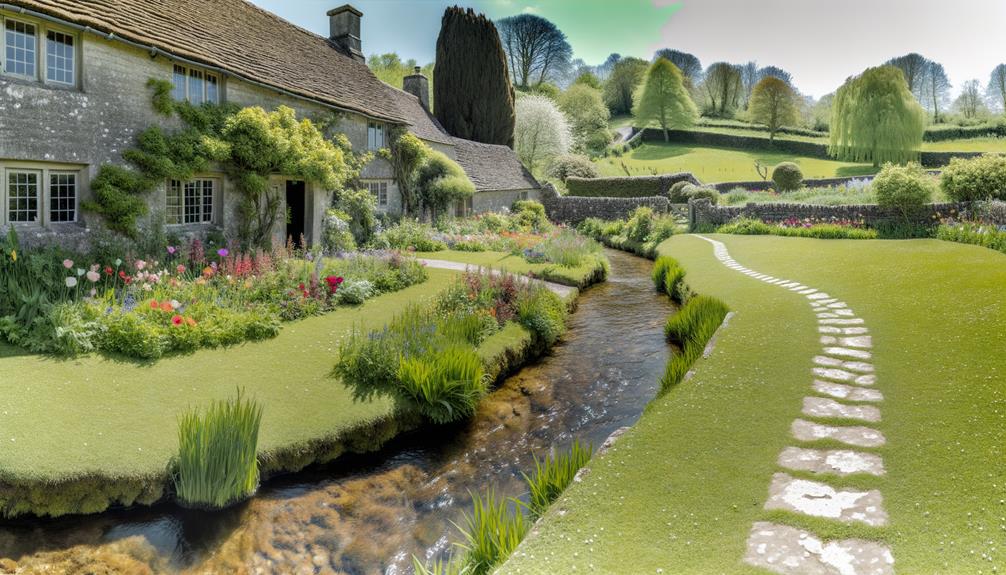Alice Name Meaning in English
The name Alice stems from the Old French name Aalis, tracing back to the Germanic Adalheidis, signifying 'noble kind' or 'of noble type.' This name evolved during the High Middle Ages through Norman influence, reflecting societal values of nobility. Its phonetic simplicity has guaranteed global adaptability, sustaining popularity across cultures and centuries.
Alice's resurgence in the late 19th century was reinforced by literary works like Lewis Carroll's 'Alice's Adventures in Wonderland,' which enshrined it as a symbol of curiosity and grace. Explore more about its cultural impact and historical significance.

Key Takeaways
- Alice means 'noble kind' or 'of noble type,' derived from the Old French name Aalis.
- The name Alice has roots in the Germanic name Adalheidis, reflecting nobility.
- It became popular in England due to Norman influence during the High Middle Ages.
- Alice symbolizes innocence, curiosity, and resilience, popularized by Lewis Carroll's 'Alice's Adventures in Wonderland.'
- The name Alice is easy to pronounce and consistent across various languages, contributing to its global appeal.
Historical Origins
The name Alice has its historical origins in the Old French name Aalis, which itself is derived from the Germanic name Adalheidis, meaning 'noble kind' or 'of noble type.' This lineage places Alice in a rich historical and cultural context.
The Germanic roots reflect the societal importance placed on nobility and lineage during the early Middle Ages. The evolution from Adalheidis to Aalis in Old French demonstrates linguistic progression influenced by socio-political interactions, such as the Frankish impact on the Romance languages.
This change underscores how names can encapsulate shifting cultural and linguistic landscapes. By the High Middle Ages, Alice became a popular given name in England, reflecting the Norman influence after the 1066 conquest.
Etymology of Alice
Delving into the etymology of Alice reveals a fascinating journey through linguistic evolution and cultural integration.
The name Alice is derived from the Old French name 'Aalis,' which itself is a diminutive of 'Adelais,' a form of the Germanic name 'Adalheidis.' The Germanic roots 'adal,' meaning 'noble,' and 'heid,' meaning 'kind, sort, type,' combined to convey the sense of a noble kind or type. Many popular names have interesting origins and pretty name meanings. In the case of Alice, these origins reflect a sense of nobility and kindness. It’s always fascinating to learn about the history and meaning behind names, and Alice is no exception. In addition to its noble and kind origins, the name Alice has also come to symbolize purity and simplicity. The name has been popular throughout history, with famous bearers such as Alice in Wonderland author Lewis Carroll adding to its timeless appeal. If you’re interested in learning more about the alan name meaning, there are many resources available that delve into the etymology and symbolism of this classic name.
This name was brought to England by the Normans and became Anglicized to Alice. Over centuries, the name retained its noble connotations while seamlessly integrating into various cultures and languages.
This etymological path underscores the fluidity of language and the enduring nature of names across time and geography.
Popularity Over Time
The name Alice has experienced notable fluctuations in popularity, often reflecting broader socio-cultural trends.
Historically, its prevalence surged in the late 19th and early 20th centuries, particularly in English-speaking countries, before experiencing a decline mid-century.
Recent statistics indicate a resurgence, with regional variations highlighting its enduring appeal across different demographics.
Historical Popularity Trends
Tracing the historical popularity of the name Alice reveals its enduring appeal, from its medieval origins to its resurgence in contemporary times. Stemming from the Old French name Aalis, itself derived from the Germanic Adelheidis, Alice gained prominence in England following the Norman Conquest. The name experienced significant popularity during the Victorian era, thanks in part to Lewis Carroll's literary classic, "Alice's Adventures in Wonderland." It saw a decline in the mid-20th century but has rebounded in recent decades.
| Time Period | Popularity Trend |
|---|---|
| Medieval Era | Introduction and Growth |
| Victorian Era | Peak Popularity |
| Mid-20th Century | Decline |
| Early 21st Century | Resurgence |
This historical ebb and flow reflect broader cultural and literary influences on naming conventions.
Regional Popularity Variations
While analyzing the regional popularity variations of the name Alice, it becomes evident that its appeal has waxed and waned differently across various cultures and time periods.
In medieval England, Alice was a favored choice, derived from the Old French name Aalis, a diminutive of Adelais.
During the Victorian era, its popularity surged, partly due to Lewis Carroll's 'Alice's Adventures in Wonderland.'
In contrast, in Scandinavia, the name Alice found favor more recently, becoming particularly popular in the early 21st century.
Similarly, in the United States, Alice peaked in the early 1900s, saw a decline mid-century, and has experienced a resurgence in recent years.
These variations showcase the name's adaptability across linguistic and cultural landscapes.
Recent Popularity Statistics
Examining recent popularity statistics, the name Alice exhibits a fascinating trend, with a notable resurgence in the 21st century after experiencing varying levels of favorability throughout different periods and regions.
Historically, Alice enjoyed immense popularity in the late 19th and early 20th centuries, particularly in English-speaking countries. The name's decline mid-20th century can be attributed to evolving naming trends favoring more modern or unique names.
However, the name Alice has seen a revival, bolstered by cultural references such as the enduring appeal of Lewis Carroll's 'Alice's Adventures in Wonderland' and its adaptations. Linguistically, Alice's simplicity and timelessness contribute to its renewed attractiveness among contemporary parents, securing its place in modern baby name charts.
Literary Influence
The name Alice has been profoundly shaped by its literary appearances, most particularly through Lewis Carroll's 'Alice's Adventures in Wonderland.' Published in 1865, this seminal work not only popularized the name but immortalized it in literary history. The whimsical journey of Alice through a fantastical world brought the name into the cultural lexicon, imbuing it with connotations of curiosity and adventure. Carroll's choice of "Alice" was strategic; derived from the Old French name Aalis, it connoted nobility and grace, harmonizing with the character's poised demeanor.
| Name Origin | Literary Work | Year Published |
|---|---|---|
| Old French | Alice's Adventures in Wonderland | 1865 |
| Germanic | Through the Looking-Glass | 1871 |
| Latin | Alice in Wonderland (Film) | 1951 |
This linguistic heritage influenced its enduring appeal.
Cultural Significance
Alice's cultural significance extends beyond literature, permeating various artistic and societal domains. It has become synonymous with innocence, curiosity, and resilience. Historically, the name Alice has roots in Old French and Old High German, derived from 'Adalheidis,' meaning noble and kind.
Its cultural resonance can be observed in numerous contexts:
- Visual Arts: Alice has inspired countless paintings and illustrations, often depicting her adventurous spirit.
- Music: The name appears in songs across genres, symbolizing purity and a quest for understanding.
- Cinema: Films featuring characters named Alice often emphasize themes of self-discovery and courage.
- Psychology: The 'Alice in Wonderland syndrome' references a neurological condition, underscoring the name's lasting impact.
These elements reflect Alice's enduring presence across various cultural landscapes.
Famous Alices
Throughout history, numerous notable individuals named Alice have left an indelible mark on fields such as literature, science, and politics. For instance, Alice Walker, the esteemed American author, is best known for her Pulitzer Prize-winning novel 'The Color Purple,' which profoundly impacted American literature. Alice Ball, a pioneering chemist, developed the first successful treatment for leprosy in the early 20th century. In the domain of politics, Alice Paul was a key figure in the women's suffrage movement in the United States, contributing notably to the passage of the 19th Amendment.
| Name | Field | Contribution |
|---|---|---|
| Alice Walker | Literature | Pulitzer Prize-winning author of 'The Color Purple' |
| Alice Ball | Science | Developed the first successful leprosy treatment |
| Alice Paul | Politics | Key suffragist in the passage of the 19th Amendment |
Modern Usage
In modern times, the name Alice has experienced a resurgence in popularity, reflecting both its timeless charm and the influence of historical and cultural figures who have borne the name. This revival can be attributed to several factors:
- Literary Influence: The enduring appeal of Lewis Carroll's 'Alice's Adventures in Wonderland' continues to inspire new generations.
- Royal Associations: The name has been favored by European royals, enhancing its prestige and elegance.
- Celebrity Choices: Prominent public figures naming their children Alice has sparked renewed interest.
- Linguistic Simplicity: Its straightforward phonetic structure and ease of pronunciation make it accessible across different cultures and languages.
These elements collectively underscore the name's enduring relevance and widespread appeal in contemporary society.
Alice in Different Languages
Reflecting its global popularity, the name Alice is adapted and embraced in various languages, each offering a unique phonetic and cultural interpretation.
In French, Alice retains its form but is pronounced as 'Ah-lees,' emphasizing its fluidity.
The German 'Aliz' reflects medieval origins, resonating with historical depth.
Spanish speakers may use 'Alicia,' a melodious variant that infuses Latin warmth.
In Italian, 'Alice' is pronounced 'Ah-lee-che,' adapting to the language's phonetic rules.
The name's adaptability is seen in Slavic languages too, where 'Alisa' is common, blending seamlessly with regional linguistic traditions.
These variations not only illustrate the name's versatility but also its rich cultural integration across different societies.
Choosing the Name Alice
Choosing the name Alice involves a thoughtful consideration of its rich historical lineage and enduring appeal.
Historically rooted in medieval Europe, Alice has maintained a steady presence in various cultures, reflecting its adaptability and timeless nature.
Additionally, its popularity has seen fluctuations, influenced by literary works and contemporary trends, making it a name that is both classic and relevant.
Historical Name Choice
The name Alice, historically chosen for its noble connotations and linguistic elegance, traces its origins to the Old French name Aalis, which itself is a diminutive of the Germanic name Adalheidis, meaning ‘noble kind’ or ‘of noble type. ‘ This etymological lineage underscores the name’s longstanding association with aristocratic heritage and refinement. The name Alice has been a popular choice among royalty and the upper class throughout history, further cementing its regal significance. Additionally, its widespread usage in literature and popular culture has helped maintain its image as a name of distinction and grace. The meaning of Amelia name is also rooted in similar noble connotations and linguistic elegance, making it a fitting choice for those seeking a name with a sense of refinement and heritage. In a similar vein, the meaning of Anastasia is also steeped in noble origins and linguistic beauty. With its roots in Greek, the name Anastasia translates to ‘resurrection’ or ‘reborn,’ carrying connotations of renewal and strength. The name has been associated with royalty and nobility throughout history, further adding to its sense of significance and regal allure. Its widespread usage in literature and popular culture has helped solidify its reputation as a name of elegance and grace, much like Alice and Amelia.
During the medieval period, the name Alice became particularly prevalent among European nobility. Several factors contributed to its historical popularity:
- Royal Influence: Kings and queens often named their daughters Alice.
- Literary Works: Prominent literary figures, such as Lewis Carroll, used the name.
- Religious Significance: Saints and martyrs named Alice.
- Cultural Adaptation: The name adapted easily to various languages and cultures.
Each of these elements played a role in solidifying Alice as a timeless classic.
Popularity and Trends
In recent decades, the name Alice has experienced a resurgence in popularity, driven by both its historical prestige and modern cultural influences. Historically rooted in Old French and Germanic origins, Alice connotes nobility and grace, evident in its etymology from “Adalheidis,” meaning “noble type.” Its revival is partly attributed to literary and cinematic portrayals, such as Lewis Carroll's 'Alice's Adventures in Wonderland' and its numerous adaptations.
Contemporary trends also reflect a shift towards classic, timeless names perceived as elegant yet accessible. Statistically, Alice has steadily climbed in baby name rankings across various English-speaking countries, signifying a broader cultural appreciation for names with rich historical and linguistic backgrounds. This trend underscores a societal inclination towards meaningful, enduring names.
Conclusion
To conclude, the name Alice, with its rich historical origins and etymological depth, has woven itself into the fabric of various cultures and languages.
Its sustained popularity, bolstered by literary figures and famous bearers, reflects its enduring charm.
Like a thread through a tapestry, Alice connects diverse eras and societies, symbolizing both tradition and modernity.
The name's linguistic versatility and cultural resonance underscore its timeless appeal in the panorama of human nomenclature.






